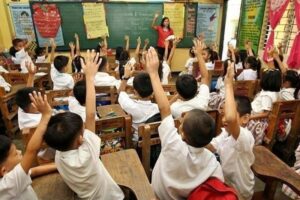Gov’t asked to fill learning losses linked to bullying, class suspensions
THE PHILIPPINE government should look to address issues, such as bullying and suspending classes for too long during extreme weather, to make up for learning loss and improve student performance, education experts told senators on Monday. “We will not be able to keep students in school if we keep suspending classes and not make up […]

THE PHILIPPINE government should look to address issues, such as bullying and suspending classes for too long during extreme weather, to make up for learning loss and improve student performance, education experts told senators on Monday.
“We will not be able to keep students in school if we keep suspending classes and not make up for the suspension,” Lizamarie C. Olegario, an associate professor of education psychology at the University of the Philippines (UP), told the Senate Committee on Basic Education.
“Teachers need to be empowered in implementing education in times of emergencies.”
She said the government should consider giving financial aid to families that live in far-flung areas, especially those affected by extreme weather.
Citing a 2020 data from the World Bank, Ms. Olegario said the learning gap in the Philippines is 5.5 years, indicating how far behind Filipino students are in their academic abilities.
In a separate 2022 study, the World Bank also found that nine in 10 Filipino children cannot read and understand simple reading materials by age 10, a learning poverty rate of 91%.
The Philippines also had a learning deprivation rate of 90.4%, which is among the highest in Southeast Asia.
“While we strive to raise learning gains, there is also a need to plug holes in learning losses and there are a lot of holes that we can plug,” Philippine Institute of Development Studies senior research fellow Michael Ralph M. Abrigo told the same panel.
He said bullying, student’s school environment, and the extended suspension and closure of school operations due to them being used as evacuation centers as factors contributing to learning loss.
Ms. Olegario cited the need for schools to focus on improving their instructions in basic subjects, such as literacy, numeracy and socio-emotional literacy.
Since August last year, the Department of Education has been implementing the Matatag curriculum, which seeks to streamline learners’ education by focusing on reading, literacy, and numeracy in the first three schooling years of a student.
Filipino students were among the weakest globally in mathematics, reading and science, based on the 2022 Programme on International Student Assessment (PISA). The Philippines ranked 77th out of 81 countries, performing worse than the global average.
The country placed 63rd out of 64 countries in the PISA assessment that ranked 15-year-old students worldwide in producing and evaluating original ideas that would translate into effective solutions.
“We don’t have to change timetables or calendars, or have catch-up Fridays to do this,” Ms. Olegario said. “We need to strengthen teaching the fundamentals in all classrooms.”
Data from the Asian Development Bank showed that 21% of children from middle-income countries who are of school age by 2030 will not learn basic primary-level skills.
Students in the Philippines and Indonesia are more than a year behind in their learning because of the pandemic, McKinsey & Co. said in a report published in 2022. — John Victor D. Ordoñez












